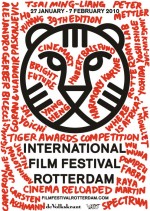 39th edition 27 January – 7 February 2010
39th edition 27 January – 7 February 2010
Truth or Dare
By Thomas Taborsky (Austrian Film critic)
Trying to live up to one's reputation is a burden. It is for a filmmaker, the same way as it is for a festival like Rotterdam, which is widely regarded as the first important venue of the calendar year. Suffice to say that at this edition, which took place from the 27th of January until the 7th of February, the bigger names of arthouse cinema mostly served as an unsafe harbour that parts of the audience would retreat to if they didn't dare to discover the unknown.
Truth is, Rotterdam hosts a festival that draws its energy from this very unknown: from the new, the innovative contexts, the wrongly forgotten. Not from the Refns, the Herzogs or the Sokurovs, but from first-time directors like Michael Noer and Tobias Lindholm, who delivered a remarkable debut effort with their prison drama R : This extremely dense film follows a convict named Rune into Horsens, a prison we will not leave until the final shot. The inmates, the guards know: Rune is weaker than the others, he will be at the bottom of the social ladder inside. That is, until he seems to find a way to be useful to the boss of his floor:
He enters business, he rises in rank. He sticks out his neck, exposes himself beyond control. Without taking away any of the turns in this hermetic story : R repeatedly pulls away the ground beneath our feet, makes good use of its camera work that reminds of, but not resembles the Dardenne brothers'. Using minimalistic music to great effect in key moments, Noer and Lindholm create a haunting, naturalist experience.
R was not alone at this IFFR in seeking for an angle to reality – though many were by far less successful. Take Vedozero, for example, an Italia
n documentary by Andrea Caccia, who gave out 70 mobile phones to pupils so they would record their lives in moments hardly reachable to the documentarist's lens; an experiment that, if anything, shows how empowered the YouTube generation is in self-determining their own image through creating media. Truthfulness, however, is not necessarily included in the process. Wu Haohao again, a young maverick director from mainland China, put together Kun1 Action, a mix of everyday footage, staged situations and a mindset fed up with what Communism has become today. Acting like Michael Moore's angry, far less structured adoptive child, he meanders around in half-philosophic phrases, declares himself a comrade of Godard, and most of all talks about himself.
Thus, it remained the task of fictional works to provide the most interesting discoveries. Like Susa, a first feature by Georgian director Rusudan Pirveli – and together with the equally well-crafted Street Days a strong life sign from Georgian cinema. Pirveli tells the story of a boy who anxiously awaits the return of his father, who may take him and his mother away to a better life in two day's time. For now, Susa has to pack his bag full with bottles of booze to sell them illegally in a town nearby. Everyone knows: He's a good boy. That ooes not make his life easier: The hoodlums near the market try to harrass him, the police chases after him. There is little to do than to carry the load and to cling to the hope for a better life. One might say Susa is a fairly standard piece of world cinema, judging from it's structure, with small details that make it more sentimental than it should be. Other parts, more important parts of the film, disagree to that. Pirveli makes the pivotal scenes work exquisitely well, while Avtandil Tetradze, the young, non-professional main actor, shines with his performance.
A boy approaching his moment of truth : film can never reach reality, but it may dare reaching out for it. As rare as these efforts are, Rotterdam again provided us with some of these works who dare. As a festival with the highest reputation, nothing less is to be expected from it – as not much more can be.
